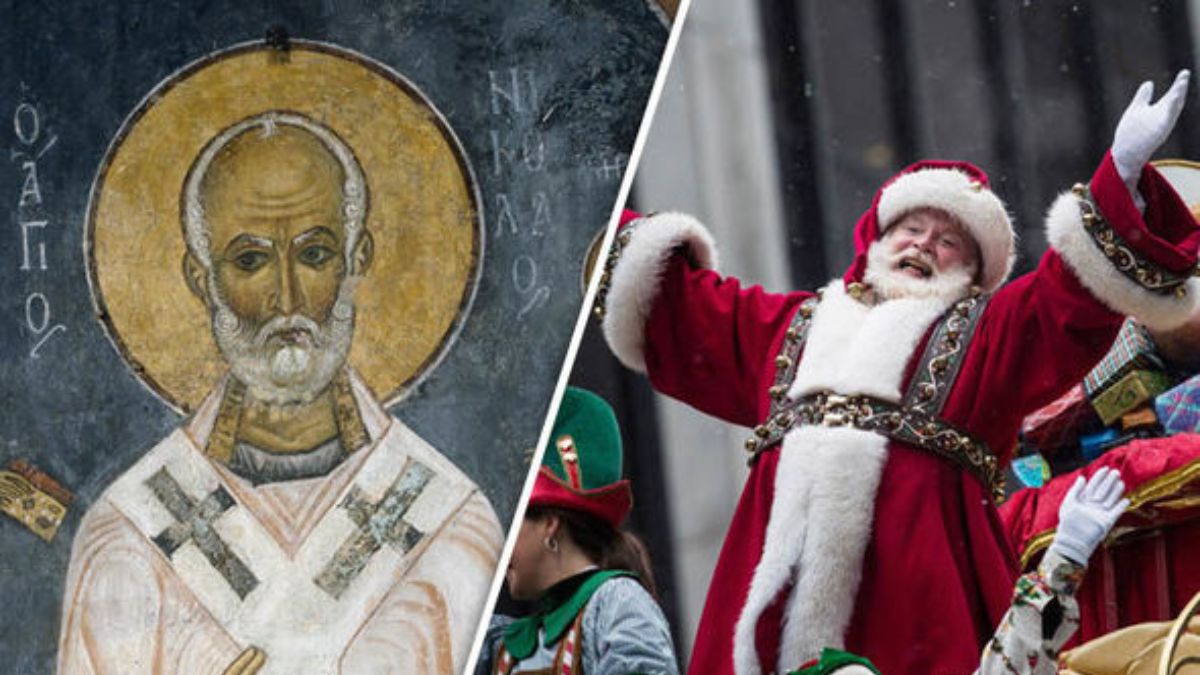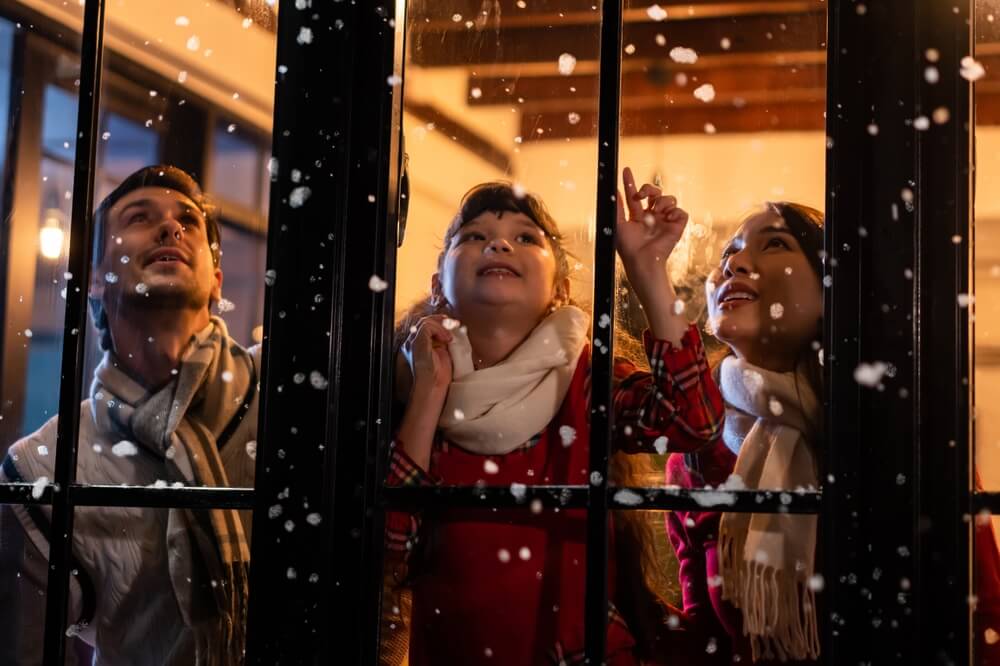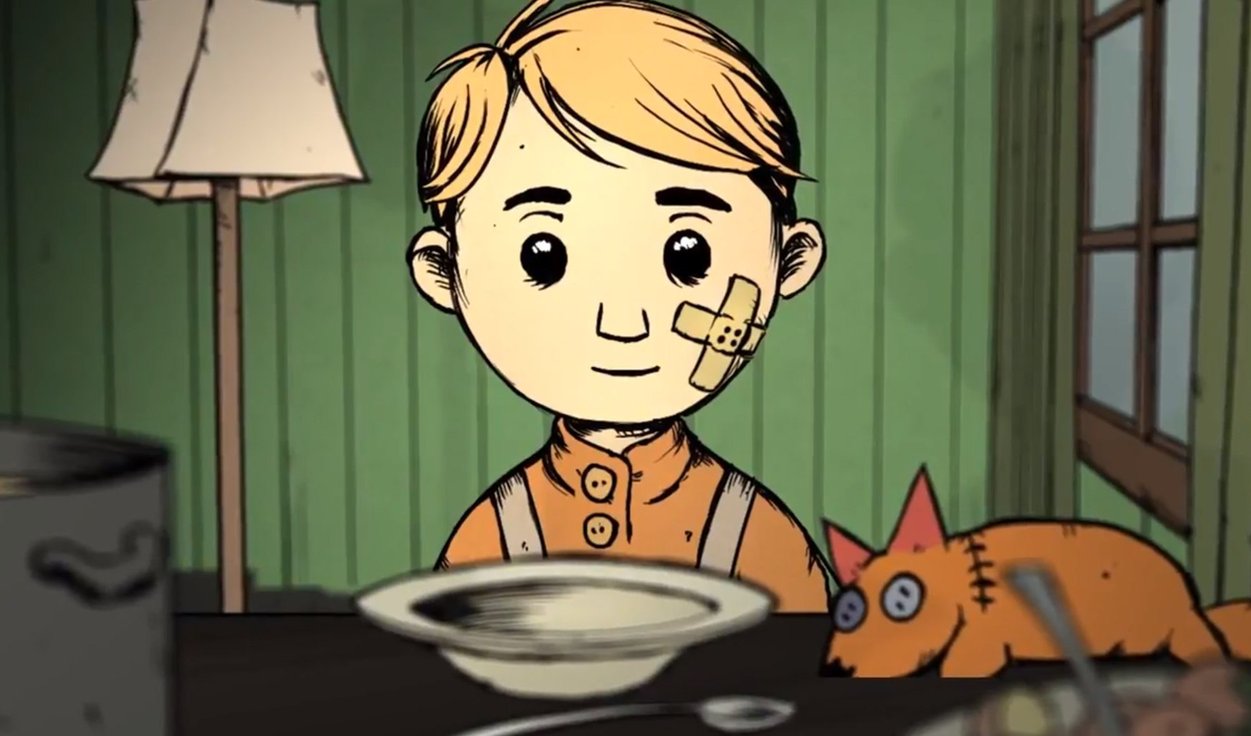How to Talk to Your Kids About Santa Claus

The magical story of Santa Claus is a special memory and experience for most children. But as they grow older and learn to think critically, they may ask you one day, “Is Santa real?”
As a parent, it’s important to know when do kids stop believing in Santa and prepare for a possibly difficult conversation with your kids about the story of Santa Claus.
Contents:
- Is Santa Real?
- When Do Children Stop Believing in Santa Claus?
- How to Talk to Your Kids About Santa Claus
- The Best Response to “Is Santa Real?”
- How to Keep the Magic of Santa Alive
- The Magical Truth About Santa Claus
- FAQ
Is Santa Real?

Kiselev Andrey Valerevich/Shutterstock.com
For those asking, “Is Santa real?”, the answer is layered with truth and history. While Santa—the jolly personality in a red suit—as portrayed in modern festivities is a blend of various cultural imaginations and stories, the essence of Santa Claus stems from a very real historical figure.
Essentially, Santa exists but has been significantly embellished and fictionalized over centuries. Today’s version of Santa amplifies the spirit of love, joy, and gift-giving, and captures the wondrous hearts of young and old alike.
While the Santa that flies in a reindeer-drawn sleigh and comes down the chimneys of every well-behaved child’s home on Christmas Eve may not exist, the idea of Santa and his character is very much real!
What is Santa’s Real Name?
Fascinatingly, the cheerful man we commonly know as Santa Claus does actually have a real name! It’s Saint Nicholas.
This isn’t a fake person completely thought up to add to the magic of Christmas; Saint Nicholas was indeed a real person who lived in the 4th century.
Saint Nicholas was widely recognized for his profound generosity and deep love for children. He was known to go to great lengths in order to protect and provide for them in times of need.
His legendary kindness and extreme benevolence earned him the title of ‘Saint’, and his actions became the foundation of the Santa Claus figure that we so joyously celebrate today.
What is the History of Santa Claus and Christmas?

St. Nicholas / Santa Claus Credit: thebegusarai.in
The story of Santa Claus, or rather Saint Nicholas, kicks off many centuries ago. St. Nicholas, the bishop of Myra, was a revered figure in the 4th century known for his benevolence and kindness towards the needy and children. This biography of the patron saint of children is quite interesting!
As time passed, stories of his goodness spread far and wide across Europe. In countries like Germany, Denmark, and Switzerland, the legends evolved based on these tales, and St. Nicholas transformed into the holiday figure we call Santa Claus.
Interestingly, the tradition of giving presents and gifts during winter began to take on a life of its own within these cultures.
For example, in Germany, children would leave their shoes out on December 6th, St. Nicholas Day, hoping they would be filled with gifts. Similarly, in Switzerland and the Netherlands, Sinterklaas would visit homes and distribute presents.
The current image of Santa Claus, a jingly, rotund, and jovial figure, was reinforced by the American version inspired by the description in Clement Clarke Moore’s poem “A Visit from St. Nicholas.” Still, his roots are deeply embedded in European tradition and folklore.
Christmas, on the other hand, is a holiday feast marking the birth of Jesus Christ. Over the centuries, the celebration of Christmas and the legend of Santa Claus intertwined, developing into the cherished tradition we know and love today.
The spirit of the season and the joy Santa brings are reminders of St. Nicholas’s generosity and goodwill towards children and the needy.
Read more Who and When Invented Santa Claus? The Whole Truth About the Christmas Wizard.
When Do Children Stop Believing in Santa Claus?

ANNA GRANT/Shutterstock.com
according to a 2018 study, it appears that the magic spell of Santa Claus typically wears off when kids reach around the average age of eight. This age is often a turning point at which children develop critical thinking skills.
It’s not uncommon for them to begin questioning if Santa is real, especially faced with tales from classmates who’ve let slip their discoveries. Despite the disillusion, it’s an integral part of their growing up, understanding the world, and distinguishing fantasy from reality.
How to Talk to Your Kids About Santa Claus

Natalia Shkavron/Shutterstock.com
Exploring the world of Father Christmas with your little ones can be a magical journey, but it’s crucial to approach the conversation with as much respect as you would any other significant topic.
Tiny hearts and minds can possess abundant curiosity, dreams, and even fears—which we, as parents, have the privilege to gently guide.
Remember, the journey of Santa Claus is often a personal one for each child—bursting with enchantment and wonder.
It’s essential to let your kids take the reins of the conversation. Allow their questions, speculations, and stories about Santa to guide the discourse. This method celebrates their imagination and freedom to explore the world in their unique way.
It also prevents you from telling kids about Santa too early in their childhood.
Respecting their feelings also means acknowledging when they’re not entirely ready for certain truths.
Not every child grows at the same rate, even in the realm of festive beliefs. Therefore, as parents, we need to be patient and sensitive, letting our children’s comfort and readiness determine the pace of this beautiful journey into the world of Saint Nick.
Embrace this period of innocence and wonder—these shared experiences create the cherished memories of childhood we hold dear as we mature. The conversation about Santa Claus is not just any chat—it’s an opportunity to create a poignant shared journey filled with warmth, magic, and joy.
What is the Right Age to Tell Kids the Truth About Santa Claus?

Hananeko_Studio/Shutterstock.com
Finding the ‘right’ age to reveal the truth about Santa can be like guessing what’s inside a festively wrapped box. Truth is, there never really is a perfect time.
Every child is unique, maturing at their own pace; hence, they should ideally arrive at this realization independently.
When the big question, “Is Santa real?” comes hurtling your way, instead of dashing their dreams immediately, initially aim to understand why they’re asking.
Did they hear something at school? Are they simply expressing doubts? When it becomes clear that they are displaying a readiness to know, don’t let the moment turn into sadness.
Encourage them to cherish their Santa-inspired memories, just as we savor our favorite holiday treats. Reassure them that the magical holiday spirit remains unscathed; it’s just the narrative that has changed. However, it’s important to give your child time to grieve the idea of Santa’s realness.
After all, despite the shift in perspective, the joy of giving, the warmth of togetherness, and the enchantment of the holiday season, once encapsulated within the jolly figure of Santa, continues to live.
How to Start a Conversation About Santa Claus

New Africa/Shutterstock.com
Just like many topics concerning your little ones, the Santa Claus conversation tends to vary from family to family.
For some, it’s initiated when the child starts questioning if Santa is real, while others take a more proactive approach, bringing the subject up themselves. But no matter the start of the conversation, what’s essential is how you navigate it from there.
Each child is unique and will have their own perception and understanding of the character called Santa Claus. Hence, understanding their perspective is key.
One effective approach is to throw out an open-ended question—something along the lines of, “So, what are your thoughts on good old Santa Claus?” The response you get can serve as a launch pad for ensuing dialogue, guiding you on how to proceed.
In this conversation, your goal should be to foster a safe environment where your child can freely express their thoughts and doubts. After all, Santa Claus is not just a character, but a symbol of the magic and innocence of childhood.
So, navigate this delicate conversation carefully, always being mindful of your child’s feelings and emotions.
The Best Response to “Is Santa Real?”

chomplearn/Shutterstock.com
Throughout your kids’ childhoods, they may ask whether or not Santa is real a couple of times. It is up to you as the parent to decide whether or not to tell them the truth about Santa when they ask.
There are multiple parenting approaches to keeping the magic of Santa alive. Some believe that if their child is too young, for example, preschool age, they will play along with Santa and tell them that he is real.
Other parents decide to tell their children the truth about Santa immediately when asked. This is fully up to the parents’ discretion.
If your child asks, “Is Santa real?” it’s a good idea to answer with a question of your own, “What do you think? Is Santa real or not?”
Your child’s answer will set the tone for the rest of the conversation. They will signal if they are ready to hear the truth from you or not.
Talking to Toddlers About Santa Claus

Evgeny Atamanenko/Shutterstock.com
When engaging your toddlers in conversations about Santa Claus, it’s key to illuminate the enchanting aspects of the story.
Stoke their curiosity by asking what they’d like Santa to bring them for Christmas. Dive into fascinating tales about Santa, his magical sleigh, and his team of reindeer, each having its unique name.
As you do, weave a tapestry of magic that will keep their eyes sparkling with joy and wonder, perpetuating the enchantment of Santa Claus and keeping this beloved holiday tradition alive in their young hearts.
Remember, keeping Santa real for them is all about nurturing their innocence and imagination.
Talking to Kindergarteners About Santa Claus

Evgeny Atamanenko/Shutterstock.com
When it comes to kindergarteners, the magical world of Santa Claus is usually one filled with unwavering belief and enchantment.
Children at this age typically don’t question the reality of Santa, offering a wonderful opportunity for parents to fully embrace and keep the Santa magic alive.
Engage in holiday traditions, read Christmas stories, and let them write letters to the North Pole.
After all, this is a special time of genuine innocence and joy. So, relish the sparkle in their eyes, the eager anticipation for Christmas Eve, and a belief in the impossible that only childhood allows.
Talking to Elementary School Kids About Santa Claus

brizmaker/Shutterstock.com
As your child steps into the ages between 8 and 11, they might start questioning the reality of Santa. This is a natural part of growing up.
It’s here that you, as a parent, can gently lay off the magic and legend of Santa, and instead encourage thoughtful questions and critical thinking.
Let them process the information, share their doubts, and come to their own conclusions.
Remember, it’s crucial to let them lead the conversation. In this way, you’re shaping their understanding while allowing them the joy of untangling this enchanting part of their childhood.
Ensure the safety of your child even from a distance, especially when they start going to school! Install the Findmykids app: always know where your child is and what is happening around them.
How to Keep the Magic of Santa Alive

Yuganov Konstantin/Shutterstock.com
Unveiling the truth about Santa can be a delicate moment. However, the spirit of Santa Claus, the joy, the giving, and the magic can continue to live on in the hearts of your children. Santa Claus, beyond the person, represents the spirit of kindness, generosity, and the magic of giving. It is this spirit that you can keep alive.
Encourage your children to emulate Saint Nicholas, sharing kindness, gifts, and cheer, especially during the Christmas season. Helping those in need and spreading joy and love can become their new Santa’s duty.
Introduce them to volunteer opportunities at local events, shelters, or hospitals. They can participate in gift drives, donate toys to children in need, or simply help decorate community centers.
It can be a beautiful and fulfilling tradition for your family that keeps the essence of Santa Claus alive.
Beyond Christmas, encourage your children to keep the spirit of Santa alive throughout the year. Small acts of kindness go a long way in creating a loving, giving world, just like Santa would want.
The Magical Truth About Santa Claus

Aleks2410/Shutterstock.com
Telling your kids the truth about Santa doesn’t signify the end of magic.
Even after everything, Santa’s charm endures. It’s about embracing the spirit of goodwill, generosity, and love that Santa personifies.
Render Santa is a symbol of love, a tradition passed down through generations. Keep the magic of Santa alive in their hearts, and you’ll find the holiday season just as joyous and enchanting.
After all, the essence of Santa isn’t tied to his existence but the hope, kindness, and joy he brings to our lives.
Let’s carry forward this magical tradition, embodying the benevolence and cheerfulness of Santa in our everyday lives.
FAQ

chomplearn/Shutterstock.com
When do kids ask if Santa is real?
Kids begin asking if Santa is real starting at eight years old, according to a study conducted in 2018.
Should I tell my 12-year-old the truth about Santa?
If your child approaches you asking if Santa is real at this age, it’s a good idea to lead them to the truth. Be mindful of their feelings and validate their emotions during this time.
Is it wrong to tell my kids the truth about Santa at an early age?
The decision of when to tell your kids the truth about Santa is entirely up to you. You must do what you believe is right for your children and how you wish to raise them.
The picture on the front page: SeventyFour/Shutterstock.com
Проверьте электронный ящик



















